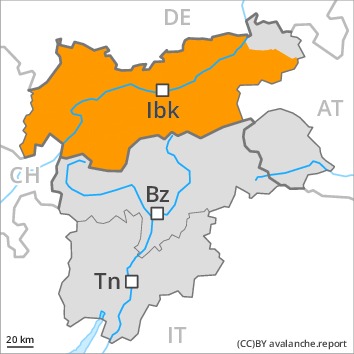
Danger level
Avalanche Problem
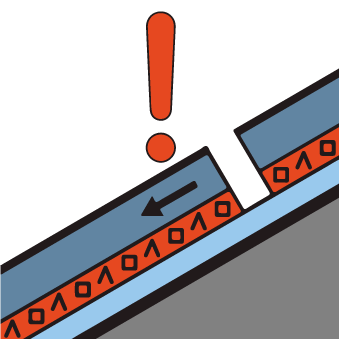 | | Persistent weak layer |
|  | |  |
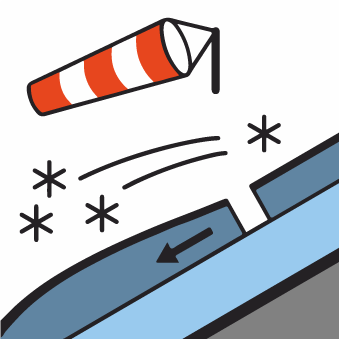 | | Wind-drifted snow |
|  | |  |

Weakly bonded old snow requires caution. Wind slabs are to be evaluated critically.
Avalanches can in some cases be released in deep layers and reach large size in isolated cases, this also applies in areas close to the tree line. Remotely triggered avalanches are possible. Natural avalanches are possible, in particular on steep shady slopes in the regions exposed to the foehn wind.
As a consequence of a sometimes storm force wind from southerly directions, sometimes avalanche prone wind slabs will form. Avalanches can be released, even by a single winter sport participant and reach medium size, especially on west, north and east facing slopes above the tree line. The number and size of avalanche prone locations will increase with altitude.
Caution and restraint are important.
Snowpack
dp.5: snowfall after a long period of cold
dp.6: cold, loose snow and wind
The old snowpack is faceted. Whumpfing sounds and the formation of shooting cracks when stepping on the snowpack and stability tests confirm the unfavourable bonding of the snowpack.
In particular on the Main Alpine Ridge up to 20 cm of snow will fall. The sometimes storm force wind will transport the fresh and old snow significantly. In some places new snow and wind slabs are lying on soft layers.
Tendency
The avalanche danger will increase but remain within the current danger level.
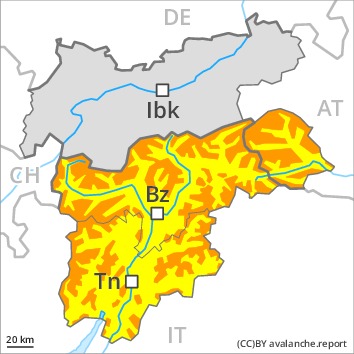
Danger level
 | treeline
|
Avalanche Problem
 | | Wind-drifted snow |
|  | |  |
 | | Persistent weak layer |
|  | |  |

Increase in avalanche danger as a consequence of new snow and strong wind. Fresh wind slabs require caution.
Fresh snow and large quantities of wind-drifted snow represent the main danger. The fresh wind slabs can be released easily in all aspects at high altitudes and in high Alpine regions. The avalanche prone locations are sometimes covered with new snow and are difficult to recognise. On wind-loaded slopes natural dry avalanches are possible as the day progresses, in particular medium-sized ones.
Avalanches can in some cases be triggered in deep layers and reach large size. Caution is to be exercised in all aspects also in areas close to the tree line.
Gliding avalanches are possible.
Caution and restraint are important.
Snowpack
dp.6: cold, loose snow and wind
dp.5: snowfall after a long period of cold
Over a wide area 20 to 40 cm of snow, and even more in some localities, will fall. As a consequence of a strong wind from southwesterly directions, further wind slabs will form. The brittle wind slabs are barely recognisable because of the poor visibility. The old snowpack will be in some cases prone to triggering. Whumpfing sounds and the formation of shooting cracks when stepping on the snowpack and field observations confirm poor snowpack stability.
Tendency
Fresh wind slabs require caution. The avalanche danger will increase but remain within the current danger level.
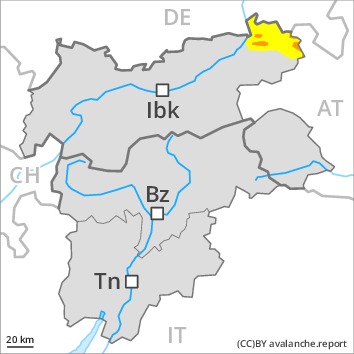
Danger level
 | treeline
|
Avalanche Problem
 | | Wind-drifted snow |
|  | |  |
 | | Wind-drifted snow |
|  | |  |

Fresh wind slabs require caution.
As a consequence of a sometimes storm force wind from southerly directions, sometimes avalanche prone wind slabs will form. Avalanches can in some places be released, even by a single winter sport participant and reach medium size, especially on steep west, north and east facing slopes above the tree line, as well as on steep shady slopes below the tree line. The number and size of avalanche prone locations will increase with altitude.
Snowpack
dp.6: cold, loose snow and wind
As a consequence of a strong wind from southerly directions, sometimes avalanche prone wind slabs will form in particular on west, north and east facing slopes. In isolated cases wind slabs are lying on a weakly bonded old snowpack, in particular on shady slopes also in areas close to the tree line. As a consequence of mild temperatures the snowpack will settle.
Tendency
As a consequence of the precipitation there will be only a slight increase in the avalanche danger.













